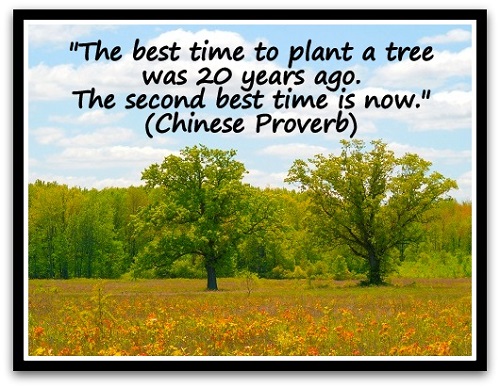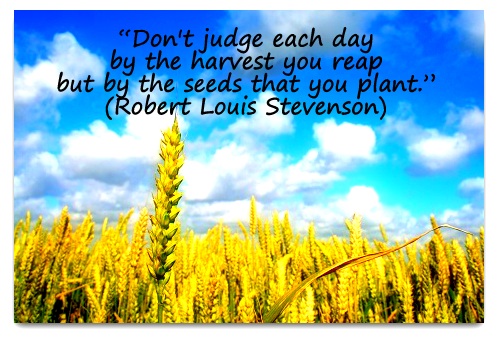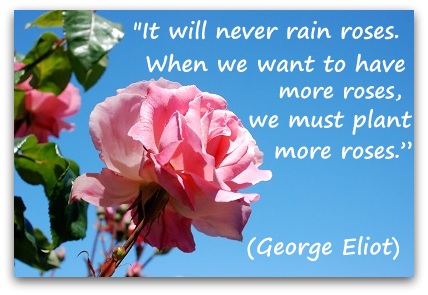Coaching Quote of the Day 4th May 2015

“Bloom where you are planted.”
(Afghan Proverb)

“Bloom where you are planted.”
(Afghan Proverb)

“A society grows great when old men plant trees whose shade they know they shall never sit in.”
(Greek proverb)

“The best time to plant a tree was 20 years ago. The second best time is now.”
(Chinese Proverb)

“Don’t judge each day by the harvest you reap but by the seeds that you plant.”
(Robert Louis Stevenson)

“It will never rain roses. When we want to have more roses, we must plant more roses.”
(George Eliot, writer)
“Plant your own garden and decorate your own soul, instead of waiting for someone to bring you flowers.”
(Veronica A. Shoffstall)
In this week’s guest post, Liz Scott returns to discuss a framework she utilises in her coaching.
By Liz Scott
My husband is a plant. Now that I know it makes it easier to communicate. I don’t mean that he’d look good in a herbaceous border and I don’t mean he’s some heavy duty machinery – no my husband is a plant of the ideas kind.
For those of you familiar with Belbin (a psychometric testing technique to determine team roles) then you’ve probably heard of some of the names of the 9 different team roles. Names like ‘plant,’ ‘shaper,’ or ‘specialist’ are to name a few. I discovered that I was a strong ‘implementer.’ In the world of Belbin this means I’m great at organising, scheduling and getting things done.
When we both went on the course to become Belbin facilitators we had no idea that our marriage would also benefit as we began to understand how and why we interact and behave in the way we do.
For example when we have a dinner party – I’ll write lists, write timings of what goes in which oven and generally plan how to get the house ready (typical traits of an ‘implementer’). Once this is done I feel I can switch off as it’s all under control. My husband by contrast will wake up in the morning and say something like, “I think I’ll make a Pavlova tonight,” (plants typically come up with spontaneous ideas) and he’ll nip out get the ingredients and whip up a meringue completely ignoring all the other things that have to be done that day.
Now when we have a dinner party I fully expect my husband to have some great last minute ideas and I’m quite relaxed about it. He might not be as great at organising and planning as I am– but he does have some great ideas… and his Pavlova’s are delicious!
Since Belbin we’re much more able to laugh at our differences rather than make an issue out of them. Indeed Belbin is very much about playing team members to their strengths rather than trying to get them to improve their weaknesses. If you’ve got a great goal keeper then you don’t need to play them as a striker to improve their goal-scoring skills. Keep in them in goal and appreciate what they bring to the team.
Indeed as a result of this Belbin training we’ve not only really begun to appreciate each others’ strengths but also those of people around us. This is an excellent philosophy to adapt to life. What would it be like if instead of focussing on someone’s weakness that we instead fully appreciated their strengths? And taking it a step further, what would it be like if instead of focussing on your own ‘faults’ you became clear on your own strengths?
As a coach it can be really helpful to utilise a framework like “Belbin” to help explain strengths and weaknesses to a client. When you work with a client using Belbin it can ensure the conversation is very non-threatening about potential vulnerabilities. It can also help clients to really understand and appreciate the strengths of others too.
About the Author/Further Resources
Liz Scott is the co-founder of Coaching Connect. Coaching Connect brings coaches together to share experience and expertise both on the web and at popular coaching events. Meet like minded coaches at the next Coaching Connect events Develop your Talents with Johnny Tenn and Coaching Connect Autumn
To read Liz’s previous guest post “Listening” click here.